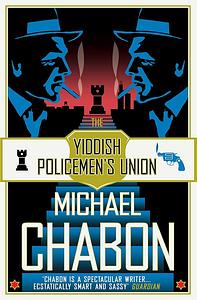Take a photo of a barcode or cover
Well. Add that to the list of media so specific I'll never be able to recommend it to anyone. Between a heavy reliance on Yiddish culture, heavy analogues to chess theory, a constant use of Yiddish language, frequent mentions of Alaska-specific Native American culture and history, a tone and protagonist so genre heavy it's almost parodic, and an absolutely bonkers plot, this book definitely wins the prize for most niche story I've ever read.
Is it good? Yes. Is it great? Not quite. I'm glad I got through to the ending, watching plot points and character arcs I'd long forgotten about finally pay off after hundreds of pages was really satisfying, but half of the journey could have been cut out with no damage to the story, and a lot of the loose threads could have either been tied up or left out competely.
The prose is nice and pretty, but just shy of the poetry the tone is looking to inspire. And scene descriptions drag on and on well beyond the necessary, often taking away from the emotional momentum of the mystery unfolding. The character dynamics are geeat, but the characters themselves are so two-dimensional it hurts. There's so much potential to explore with Berko, with Bina, with Zimbalist, and Baronshteyn, that seems wasted on gritty noir-style inner monologue. Landsman is in a psychological mess, Berko is in an ethnic-cultural split, Bina is wounded and persistent, but these traits are inferred, not explored. Maybe that's outside the scope of this story, but it's all I could think of as I was reading the hundredth paragraph about the particular hair colour of one bodyguard for someone only tangentially important to the story.
Still, the mystery itself was so insane that I couldn't stop reading, and it just kept getting more and more wild with every revelation, without ever feeling cartoonish until looked at from retrospect. The dialect and world building were pretty great, and the humour often hit just the spot.
Overall, an impressive feat of a book, if not one that everyone would enjoy.
Is it good? Yes. Is it great? Not quite. I'm glad I got through to the ending, watching plot points and character arcs I'd long forgotten about finally pay off after hundreds of pages was really satisfying, but half of the journey could have been cut out with no damage to the story, and a lot of the loose threads could have either been tied up or left out competely.
The prose is nice and pretty, but just shy of the poetry the tone is looking to inspire. And scene descriptions drag on and on well beyond the necessary, often taking away from the emotional momentum of the mystery unfolding. The character dynamics are geeat, but the characters themselves are so two-dimensional it hurts. There's so much potential to explore with Berko, with Bina, with Zimbalist, and Baronshteyn, that seems wasted on gritty noir-style inner monologue. Landsman is in a psychological mess, Berko is in an ethnic-cultural split, Bina is wounded and persistent, but these traits are inferred, not explored. Maybe that's outside the scope of this story, but it's all I could think of as I was reading the hundredth paragraph about the particular hair colour of one bodyguard for someone only tangentially important to the story.
Still, the mystery itself was so insane that I couldn't stop reading, and it just kept getting more and more wild with every revelation, without ever feeling cartoonish until looked at from retrospect. The dialect and world building were pretty great, and the humour often hit just the spot.
Overall, an impressive feat of a book, if not one that everyone would enjoy.
I wanted to like this book. I really did. I've heard great things about Chabon's writing and was looking forward to finally reading it; however, I was disappointed.
It may be just because I’ve never been into detective books that I didn’t like this novel much. I just couldn’t really bring myself to care a whole lot about why this junky was murdered or to even hold my breath a little when the main character was being shot at. Maybe detective books just don’t do it for me, but I found the story a bit boring.
The one technical complaint I have about this novel is Chabon’s tendency to put long descriptions or internal flashbacks smack in the middle of a conversation. Without a section break, re-entering the conversation was often really jarring and awkward, forcing me first to be disoriented by the change in tense and setting, and then to go back a multiple paragraphs — or even pages, in a few cases — to remind myself of the question eliciting Landsman’s delayed two-word response. Some conversations lost their flow and were hard to follow because of descriptions and internal ramblings inserted into strange places.
On the plus side, I did like Chabon’s writing, for the most part; it is rich with lush descriptions and wonderful metaphors. Although some of his creative touches were a bit odd (in particular, the description of a character’s voice sounding like an onion rolling around in the bottom of a bucket — what?), others were really beautiful:
“She puts a hand to his mouth. She has not touched him in three years. It probably would be too much to say that he feels the darkness lift at the touch of her fingertips against his lips. But it shivers, and light bleeds in among the cracks.”
Although I didn’t particularly love this book, I think someone who likes mystery/detective novels would really enjoy it.
More book reviews at Books Speak Volumes.
It may be just because I’ve never been into detective books that I didn’t like this novel much. I just couldn’t really bring myself to care a whole lot about why this junky was murdered or to even hold my breath a little when the main character was being shot at. Maybe detective books just don’t do it for me, but I found the story a bit boring.
The one technical complaint I have about this novel is Chabon’s tendency to put long descriptions or internal flashbacks smack in the middle of a conversation. Without a section break, re-entering the conversation was often really jarring and awkward, forcing me first to be disoriented by the change in tense and setting, and then to go back a multiple paragraphs — or even pages, in a few cases — to remind myself of the question eliciting Landsman’s delayed two-word response. Some conversations lost their flow and were hard to follow because of descriptions and internal ramblings inserted into strange places.
On the plus side, I did like Chabon’s writing, for the most part; it is rich with lush descriptions and wonderful metaphors. Although some of his creative touches were a bit odd (in particular, the description of a character’s voice sounding like an onion rolling around in the bottom of a bucket — what?), others were really beautiful:
“She puts a hand to his mouth. She has not touched him in three years. It probably would be too much to say that he feels the darkness lift at the touch of her fingertips against his lips. But it shivers, and light bleeds in among the cracks.”
Although I didn’t particularly love this book, I think someone who likes mystery/detective novels would really enjoy it.
More book reviews at Books Speak Volumes.
Bizarre and compelling. Old-fashioned in tone (noir, I guess they call it,) alternate-reality present in setting (disconcerting - not in a bad way,) and if it weren't so well written you might want to call it over written. All kinds of Yiddish, and Alaskan native, and other things I know nothing about. Fun to read, suspenseful, bigger than the story, in ways. Probably knows it too.
Alcoholic detective pursues grizzly murder investigation at any cost, even after he's stripped of his badge and gun. Uncovers grand conspiracy. It's a pervasive noir storyline that borders on cliche, but Chabon executes it competently enough. This one starts out slow, but things get interesting in the second half. Chabon is a bit, er, Chabonesque here with the purple prose, and the story drowns in overdescription at points. Worth a read if you like detective stories or alternate history.
Don’t read this book on Kindle. There is a Yiddish/English dictionary at the back, but you know how flipping around a book is on Kindle. I was amazed at how few Yiddish words were in the dictionary, also. I have been blessed with friends and employers who spoke Yiddish, so I got along, but the words I didn’t know interrupted the whole story flow. The ending was a bit too goody-goody for my taste.
Chabon is the consummate wordsmith. His prose is as rich and complex as the inner life of his characters. Once I adjusted to the rhythms of the Alaskan-Yiddish patois, I couldn't put this book down. It's a great potboiler steaming with murder, chess, zionism, evangelical extremism, and much, much more.
My Jewish culture is a little weak but Chabon writes beautifully and made me laugh out loud.
A great detective story that is set in a completely fictional place. The story starts out under the premise that instead of the creation of Israel after WWII, Jewish people from across the world were sent to a territory in Alaska, Sitka. It took me a little while to get into the book, but once I did, I really enjoyed it. Its a great mystery book and Michael Chabon has created this really interesting, totally fictional world. I'll definitely read other books by Chabon.
Combining the classic homicide detective novel with an alternate reality in which a Jewish district was created in Alaska in 1948 after the Israeli state didn’t work out is a stroke of genius. For many of us, Yiddish (even translated into English so thoroughly that the “American” language sounds awkward) is a foreign language, down to the “Strange times to be a Jew” that pervades the novel, and much of Jewish wistfulness. Sending me off-tilt with the setting was enough to make a murder mystery into a full description of a fanciful world, with motives so far reaching that they are intended to bring about the end of the world as we know it.
The characters took longer to install themselves in my brain and heart than the characters in some of his other novels, but the themes of alienation and isolation, even in a district already isolated to the point of being ridiculous.
The characters took longer to install themselves in my brain and heart than the characters in some of his other novels, but the themes of alienation and isolation, even in a district already isolated to the point of being ridiculous.
It took me three long weeks to finish this verbose murder mystery. It had great potential, but the focus was often ruined by additional imagery that didn't necessary paint a picture. For example:
The way she (Bina, Landsman's ex-wife) looks reminds Landsman of an engagement party they went to years ago, for a friend of Bina's. The birde-to-be was marrying a mexican (sic), and as a kind of joke, the party had a Cinco de Mayo theme. They hung a papier-mache penguin from a tree in the year. Children were blindfolded and sent forth, armed with a stick, to deal the penguin blows until it broke open. The children beat the penguin with savagery, and then the candy came showering down. It was just a bunch of wrapped toffees, peppermint, butterscotch, the kind your great-aunt could be relied upon to supply from a dusty crevice of her handbag. But as it rained from the sky, the children swarmed with a bestial joy. And Bina stood there watching them with her arms folded and a pleat at the corners of her eyes.
What in the world?! All of that description, and I still have no clear picture of how she was standing or how she looked. Furthermore, it is not germane to the story, so why just fill the page up with words like a poor Literature student who is trying to meet a page requirement for a term paper? Chabon could benefit from the advice I used to give my students: Writing should be a like a skirt; long enough to cover the topic but short enough to keep it interesting.
In short, I would not recommend this book nor would I consider reading another book by this author.
The way she (Bina, Landsman's ex-wife) looks reminds Landsman of an engagement party they went to years ago, for a friend of Bina's. The birde-to-be was marrying a mexican (sic), and as a kind of joke, the party had a Cinco de Mayo theme. They hung a papier-mache penguin from a tree in the year. Children were blindfolded and sent forth, armed with a stick, to deal the penguin blows until it broke open. The children beat the penguin with savagery, and then the candy came showering down. It was just a bunch of wrapped toffees, peppermint, butterscotch, the kind your great-aunt could be relied upon to supply from a dusty crevice of her handbag. But as it rained from the sky, the children swarmed with a bestial joy. And Bina stood there watching them with her arms folded and a pleat at the corners of her eyes.
What in the world?! All of that description, and I still have no clear picture of how she was standing or how she looked. Furthermore, it is not germane to the story, so why just fill the page up with words like a poor Literature student who is trying to meet a page requirement for a term paper? Chabon could benefit from the advice I used to give my students: Writing should be a like a skirt; long enough to cover the topic but short enough to keep it interesting.
In short, I would not recommend this book nor would I consider reading another book by this author.




